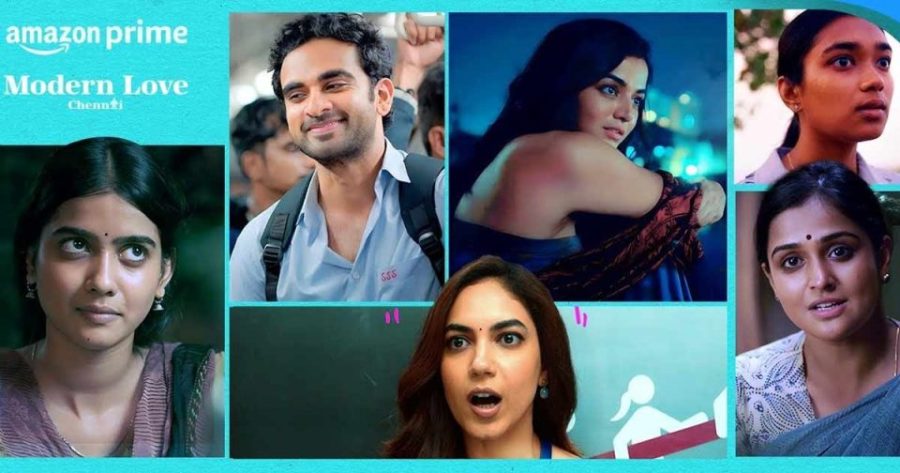
Modern Love Chennai delivers but Bharathiraja and Thiagarajan Kumararaja's shorts are the best

‘Modern Love’, Amazon’s popular show based on the hit New York Times column, is back with the Chennai edition this time. The anthology show has a reputation for splitting the viewers into two warring factions: either they love it or they don’t. There is no middle ground here.
Amazon tried adapting the concept in an Indian setting previously with Modern Love Mumbai and Modern Love Hyderabad which yielded a mixed bag of results. As with the previous shows, they come across either too vanilla for a love story or don’t leave us with the desired emotional impact. Modern Love Chennai seems to have course-corrected the issues we have had in the past with the idea. The show, overseen by creative producer, Thiagarajan Kumararaja, brings together a diverse set of voices often leaving us with a bunch of mixed emotions.
‘Modern Love Chennai’ consistently delivers. It brims with an energy that is both adventurous and sentimental, just like love. The six-episode show takes a holistic approach towards highlighting the broader definitions of the idea of love and modern-day romance.
‘Marghazhi’: The colours of first love
For instance, in Akshay Sundher’s beautifully-naive ‘Margazhi’, love brings happiness to Jasmine (Sanjula Sarathi) and restores the colours in her otherwise mundane life. A teenager to recently separated church-going parents, Jasmine feels alone suddenly.
In order to cloak her aloneness, she listens to music all the time. At least, she tries.
Also read: Dahaad review: A perfect antidote to toxic propaganda, unveils truths of our times
In fact, when Jasmine is introduced in the episode at a counselling session with a psychologist, she listens to Ilaiyaraaja’s energising ‘Thendral’ (a throwback ‘80s song) that keeps getting interrupted as if to tease the audience with what’s to come.
Jasmine’s father tells the priest that the divorce has affected her and there has been a distance since then. She is advised to attend Catechism classes and to participate in the choir. Her father, meanwhile, is tasked with taking keyboard lessons for children.
When Jasmine notices Milton (Chu Khoy Sheng) in the choir, her eyes sparkle as the pulsating ‘Thendral’ plays again in the background. There is curiosity at first, which later blooms into that virginal feeling of adolescent love. She fantasies about him. Like a butterfly ready to spread its wings and take its first flight in search of nectar, Jasmine comes out of the cocoon.
We see the gradual change in her personality as she gets friendlier with Milton. They play basketball together and later the keyboard. They have common tastes in music (‘Uravugal Thodarkathai’ from ‘Aval Appadithan’). They, in fact, share similar fates (Milton’s parents are separated too).
Akshay Sundher shoots his subjects either at the centre of the frame or at the corner. On a big screen, their presence is imposing. He mostly shoots ‘Margazhi’ with wide shots that benefit from contrasting colour correction and grading, that even makes St Thomas Mount look like a fantastical La La Land! At the same time, very few movies have tried to understand the intense feeling of a teenage girl discovering love as closely as this short (adapted and written by filmmaker Balaji Tharaneetharan).
We not only get the external feelings (the way Jasmine looks at Milton and the features she admires) but also the internal — from her biting her lips shyly, checking if she has pimples on her cheeks to twice-checking her smile with braces.
Something about ‘Margazhi’ allows you to feel like 17 again. I guess it is our own naivety that the short is after. For, this movie is like gentle musical notes. First love, I tell you.
 Also read: Afwaah review: Sudhir Mishra’s warning against fake news is unsubtle but urgent
Also read: Afwaah review: Sudhir Mishra’s warning against fake news is unsubtle but urgent
‘Imaigal’: A middle-class melody
In contrast, Balaji Shakthivel’s ‘Imaigal’ begins as a harmless love story between two college students, Nithya (Ashok Selvan) and Devi (TJ Banu), until it isn’t. Devi suffers from a rare condition that results in her vision diminishing. Given her condition, she asks Nithya to decide about the future. Devi is fine with anything but Nithya says he is in.
Here, the definition of love takes the form of care, where Nithya and Devi enter into a marriage on that promise until it wasn’t.
The good news is, Balaji Shakthivel isn’t after big things. ‘Imaigal’ is about two ordinary people; their ordinary lives; their ordinary desires; ordinary fights and insecurities. There is something middle-class even in the dresses the actors wear. Ideally, the short should have been titled ‘Middle Class Melodies’ for it demolishes the romantic notions associated with love by showing the reality post marriage: domestic life and running the house in a patriarchal system.
Mind you, ‘Imaigal’ isn’t a message-mongering movie. This is a short in the anthology that has a lot of flab in the writing (partly due to its sprawling narrative that goes for decades) but has a ton of heart. I almost forgot about Devi’s condition about half-hour into the short until it comes back in a touching moment and hits you like a ton of bricks.
Balaji Shakthivel seems aware that the ‘conflict’ (sharing responsibilities) isn’t punchier enough. He makes us see it through Devi. We feel for her. We empathise with her. Isn’t this female gaze, too? The closing shot says so.
 The charming ‘Kaadhal Enbadhu Kannula Heart Irukkura Emoji’
The charming ‘Kaadhal Enbadhu Kannula Heart Irukkura Emoji’
Isn’t Krishnakumar Ramakumar too funny at times? At least he doesn’t try to be funny. With ‘Kaadhal Enbadhu Kannula Heart Irukkura Emoji’ Krishnakumar hits it out of the park.
There is something contagiously charming about his short that is both a laugh-out-loud parody on Tamil cinema and a self-reflection of the way we perceive love. A cinema geek who binges on romantic movies, Mallika (a charming Ritu Varma) defines love through the iconic movies she has seen over and over. She succumbs to the idea of a fantastical romance that is far-fetched from reality.
As a result, she ends up finding the wrong people at the wrong time only to be left heart-broken each time. She dances in the rain like Reema Sen from ‘Minnale’ thinking that this is romance. Until someone asks her to switch off the music and dance.
‘Kaadhal Enbadhu Kannula Heart Irukkura Emoji’ is a short that separates love from the unreal, thanks to the likes of Gautham Menon and Mani Ratnam among others. Written by Reshma Ghatala, the short is self-aware of its scope and limitations, and it is never saccharine.
Also read: Why Mani Ratnam’s Ponniyin Selvan will be praised as a masterpiece of all time
My favourite moment is when Mallika goes through a breakup and wonders why there isn’t a soup song for girls. “I felt like Tamil cinema gave up on me for the first time,” she says. Even Revathy’s “Kambli poochi oora mari iruku” dialogue from ‘Mouna Raagam’ surfaces in a manner you wouldn’t expect. You mostly laugh at the expense of Mallika because the joke is invariably on us and on our unrealistic expectations. You are not alone, Mallika.
 ‘Lalagunda Bommaigal’: Love is a happy compromise
‘Lalagunda Bommaigal’: Love is a happy compromise
Rajumurgan’s ‘Lalagunda Bommaigal’ has a sardonic humour running through the veins of the screenplay. In the very beginning, Shoba (Sri Gouri Priya) is at the hospital after she gets knocked down by a guy who runs away. She works at a butter biscuit-making outlet at a small neighbourhood in Lalagunda whose majesty lies in being a home for all.
There is a Telugu-speaking population, Urdu and Hindi too. “Has there ever been an intermix?” asks a character referring to Shoba. She has taken interest in the panni puri-selling Nathuram (Vasudevan Murali) who runs Mumbay Chaats.
A godman warns Shoba about falling in love with a guy who hails from the north. This arrives in the form of a delightful twist in the end. ‘Lalagunda Bommaigal’ is deceptively simple and has the philosophical musings of Haruki Murakami. It argues that love is nothing but a happy compromise. Perhaps a more suitable definition comes from the short itself: “You cannot live with (wo)men. At the same time, you cannot live without (wo)men.”
‘Paravai Kootil Vaazhum Maanga’: A literary classic novel
Coming to my favourite short: Bharathiraja delivers a stunner with ‘Paravai Kootil Vaazhum Maanga’ from a terrifically-adapted script by Pratheep Kumar S. It has the emotional heft and bears the literary weight of a classic novel unlike other shorts. Balachander would have called it ‘Thappu Thalangal’; it opens with a man and a woman and their interconnecting lives in a metro.
Ravi (Kishore) wrongly answers Rohini’s (Vijayalakshmi, who’s terrific) phone as they sit next to each other unaware of their worlds in a metro train. They bump into each other more and begin to feel a sense of comfort as ‘En Iniya Pon Nilave’ plays in the background. Although the ideal song would be ‘Pon Malai Pozuthu’.
Rohini soon realises that Ravi is married and a father of two kids. In a stunning shot, one of the kids takes a selfie where Ravi’s family is in the foreground and Rohini is relegated to the background. Notice how Bharathiraja repeats the same shot later that produces a different effect.
The filmmaker, at 80, gives a masterclass in direction. The way he stages the sequence inside Ravi’s house with Revathi and Rohini and the exchanges between them displays a rare passion for cinema that is hard to find these days. Revathi (a fantastic Ramya Nambeesan), the mother of the kids, is gracious enough to accept Ravi’s decision.
‘Paravai Kootil Vaazhum Maanga’ is a short that lets us get into the heads of Ravi, Revathi and Rohini and yet feel unsure of taking a stand. For Rohini, a recent divorcee, it is about wanting to be a part of Ravi-Revathi’s world. “Shouldn’t you create a new world instead,” says Revathi, for whom marriage is an arrangement between a man and a woman and that can change.
Ravi, on the other hand, had fought with his parents for Revathi. When his father asks what if he leaves Rohini for another woman tomorrow, he stays mum. Instead, Ravi says, “It is true that I loved Revathi and it is true that I want to leave her now. Even after all these decades, the one thing you cannot understand is what the heart wants.”
That scene on the terrace where Rohini says, “You gave me everything but I have nothing to return” is a stunner. Equally stunning is when Rohini says, “When I look at Ravi in the metro, I only see him. I never bothered looking at what’s behind closed doors. There is a world. Your world.”
I could feel a lump in my throat when the short was dedicated to Balu Mahendra. Perhaps this is a movie that Balu Mahendra might have shown interest in, given the complex nature of the story and the resulting emotions that are conflicting. But, the closing shot of the short has the signature of another great filmmaker. Yes, Bharathiraja only.
 Ninaivo Oru Paravai: Stripping love down to the basics
Ninaivo Oru Paravai: Stripping love down to the basics
Trust Thiagarajan Kumararaja to use classical music for the rhythms of the bodies. Also trust him to superimpose the passionate sexual encounter of a couple madly in bed that morphs into the heartbeat of the earth. Such eccentricities are expected and characteristic of Kumararaja.
In ‘Ninaivo Oru Paravai’, he strips down the definition of love to the basics. What is courtship if not a mere selfish desire for carnal pleasures? Sam (an excellent Wamiqa) and K (an equally excellent PB) enter into a courtship after such a contemplation. But “everything is not about sex, my Freud kutty,” Sam corrects her live-in partner K’s hypothesis.
In another film, when two characters go to a pub and look at dancers, they might probably think the dancers are having fun. But in Kumararaja’s universe, Sam and K think that “humans are interesting creatures” that borderlines into a conversation about “peacocking” and “mating rituals”. K says the dancers are looking for action. Sam laughs. They contemplate a lot more. They wonder about bodily pleasures, about marriage, about relationships and having kids.
As aspiring artists trying to make it in the movie business, Sam and K talk as if they are trying too hard to impress Thiagarajan Kumararaja to take them in as his ADs. Take for instance, when K tells Sam that marriage in the times of caveman must have been a mere understanding of monogamy. “Rituals and traditions came later just like God,” says K.
‘Ninaivo Oru Paravai’ follows a reverse chronology in a romantic love relationship, where its characters get to determine what their “they lived happily ever after” moment is. For, the short begins with the conflict (which is a break up) and gets a resolution (patch up).
Sensuality might not be the binding emotion in Kumararaja’s 69-minute short; it is nevertheless the binding force that keeps Sam and K’s relationship alive. There is a certain sense of possessiveness Kumararaja seems to have with the aesthetics of his movies.
The colour palette of ‘Ninaivo Oru Paravai’ looks rich with a bluish-grey tint that leaves a painterly quality to the frames (cinematography is by Nirav Shah and Jeeva Shankar). His short is what would look like if Park Chan-wook’s ‘The Handmaiden’ and Wong Kar-wai’s ‘In the Mood for Love’ ended up in a courtship. Ilaiyaraaja’s jazz composition brings a sense of hypnosis to the short.
Despite watching it twice, I found Kumararaja’s strand to be the most difficult to write about simply because there is a lot to unpack. The short, which is about memories and the lack of it, has the spirit of ‘Eternal Sunshine of the Spotless Mind’.
Like memories that tumble out like pearls without a linear order, ‘Ninaivo Oru Paravai’ is sprawling as it is engrossing. The short comes dangerously close to meandering and when it does, it is intermittently effective. But, when Kumararaja comes alive as a filmmaker is not when he wonders about the metaphysical nature of two individual forces abided by love. But when the characters run, live, laugh and breathe like there is no tomorrow. After all, ‘Ninaivo Oru Paravai’ illustrates that the strangest love stories are often messy affairs.

